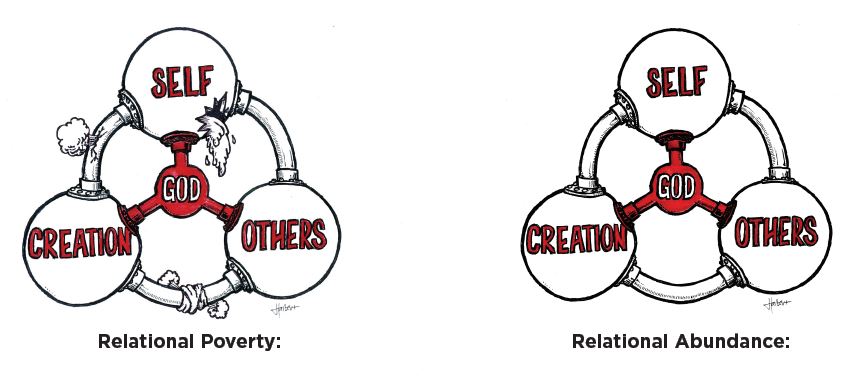No matter how careful or attentive we try to be, we all experience the pain of broken relationships at some point in our lives. No one is exempt. In their book, When Helping Hurts, authors Corbett and Fikkert describe four key areas of relational brokenness that result in emotional poverty—or in "relationships that do not work, that are not just, that are not for life, [and] that are not harmonious or enjoyable.” When any one of the four relationships below are not functioning properly, people are unable to fulfill their calling in life.
Four Key Relationships for an Abundant Life
A right relationship and healthy dependence on God
A secure relationship with ourselves as a unique child of God
Connected relationships with others, characterized by empathy
A vital relationship with the rest of creation (or the world)
These key relationships are the building blocks of all human activity and form an interconnected pipeline. This life-giving flow allows us to live out the truth of Jesus’ words: “I have come that you might have life and have it to the full” (John 10:10).
Healthy trust and dependence on God is the first relationship, and it provides a secure base in which to interact with others and the world. The quality and authenticity of our relationships with others is directly connected to our relationship with ourselves and our own uniqueness as a child of God (Galatians 5:14). The ability to love others well is demonstrated through our care and empathy towards the people around us—our families, friends, neighbors, and communities. The final piece in this pipeline is the relationship with the rest of creation (the world)—and finding our place and purpose in it through a meaningful vocation.
No one is exempt from brokenness in their relationships with God, self, others, and the rest of creation at some point in life. In light of this reality, we have the opportunity to practice new levels of compassion with one another. God invites us to partner with him in the ministry of reconciliation. "And all of this is a gift from God, who brought us back to himself through Christ. And God has given us this task of reconciling people to him" (2 Corinthians 5:18). Reconciliation happens most authentically when we understand our own broken relationships in light of God’s redemptive work. Jesus Christ is described in scripture as the Creator, Sustainer, and Reconciler of all things (Colossians 1:15-20). The authors of When Helping Hurts state that, “Jesus died for our souls, but he also died to reconcile—that is, to put into right relationship all that He created."
It is a high honor to be invited into the story of another person as they learn to release painful memories and experiences that have kept them in bondage, and experience new ways of relating to God, themselves, and others. Our hope is to meet each person where they are . . . and to empower each individual, couple, and family experiencing brokenness with the tools needed to gain wholeness, healing, and freedom for an abundant life.



